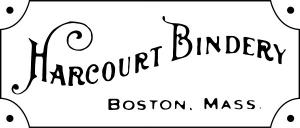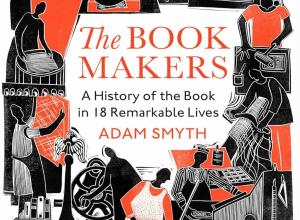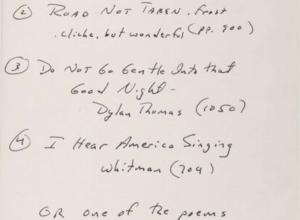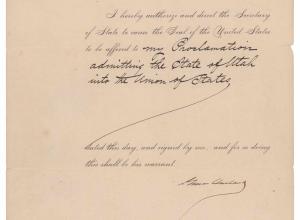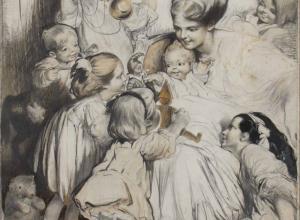November 6, 2012
The Papers of Hyland “Bud” Lyon at Bonhams
San Francisco—Bonhams is proud to present its sale “The Xi’an Incident: The Papers of Hyland “Bud” Lyon,” December 11 in San Francisco. The Xi’an Incident (December 12-24, 1936) was a pivotal moment in modern Chinese history, when a brave Nationalist Chinese General, Zhang Xueliang [1901-2001], placed Generalissimo Chiang Kai-shek under house arrest, in essence forcing him to negotiate with the Communist Chinese forces (led by Mao Zedong) to cease hostilities and join forces against the invading Japanese army. The Lyon papers include rare and important letters and documents signed by Mao Zedong and other high-ranking Chinese Communist Party officials that have never before been publicly exhibited.
Hyland “Bud” Lyon was a Hollywood stunt man, racecar driver and auto mechanic who became an expert in airplane mechanics in Burbank, Calif., before following a showgirl to Shanghai in late 1934. Once in China, Lyon landed a job as a mechanic for the China National Aviation Corporation (CNAC), and joined a small community of Americans and other ex-pats who were building China’s nascent aviation industry. Less than a year after his arrival, Lyon was offered a job as mechanic and co-pilot for Zhang Xueliang, [also spelled Chang Hsueh-liang] known as the “Young Marshal,” a Manchurian warlord who was one of Chiang Kai-shek’s most trusted generals. Zhang was also, however, an outspoken opponent of any appeasement toward Japan.

Hyland “Bud” Lyon was a Hollywood stunt man, racecar driver and auto mechanic who became an expert in airplane mechanics in Burbank, Calif., before following a showgirl to Shanghai in late 1934. Once in China, Lyon landed a job as a mechanic for the China National Aviation Corporation (CNAC), and joined a small community of Americans and other ex-pats who were building China’s nascent aviation industry. Less than a year after his arrival, Lyon was offered a job as mechanic and co-pilot for Zhang Xueliang, [also spelled Chang Hsueh-liang] known as the “Young Marshal,” a Manchurian warlord who was one of Chiang Kai-shek’s most trusted generals. Zhang was also, however, an outspoken opponent of any appeasement toward Japan.

In April of 1936, unbeknownst to Chiang Kai-shek, Zhang met with Zhou Enlai to negotiate an end to hostilities between the Communists and the Nationalists. Throughout that year, secret discussions continued, and Zhang’s behavior raised Chiang’s suspicions. In December of 1936, Chiang Kai-shek flew to Xi’an to test the loyalty of the Kuomintang (KMT) forces under Zhang, and to personally lead an attack on nearby Communist forces. Zhang Xueliang and another General, Yang Hucheng, tried desperately to convince Chiang to join forces with the Communist army to resist the Japanese. When they were unable to elicit a compromise, they took matters into their own hands, and on December 12, 1936, Zhang and his forces stormed Chiang’s headquarters and arrested Chiang, triggering the Xi’an Incident.
The Xi’an incident was reported at the time as a treasonous coup by Zhang, but it is fairer to describe it as a “forced negotiation process.” Chiang Kai-shek was kept under house arrest for nearly two weeks, during which time Zhang and Yang asked the Communists to send a delegation to Xi’an to discuss the fate of China. For much of the time Chiang resisted negotiations, until it became clear that his life and freedom depended upon it.
On December 17, the CPC delegation, including Zhou Enlai, arrived, but negotiations with Chiang were not fruitful. On December 22, Madame Chiang Kai-shek and her brother T.V. Soong arrived to continue negotiations, and on December 24, an informal agreement was reached (though Chiang Kai-shek never officially signed any peace documents). Hostilities between the two sides, however, immediately ceased, allowing for a successful resistance to Japan.
After Chiang’s release, Zhang Xueliang was arrested, tried in a military court, and sentenced to 10 years for his part in the incident, though he wound up spending nearly the rest of his life (until 1989) under house arrest. In the immediate aftermath of the Xi’an incident, Zhang asked Hyland “Bud” Lyon to act as bodyguard to his wife, Edith Chao, and young son, Bobby. For the next five years, while Zhang was in prison in Shanghai, Lyon piloted the family about, took care of many important domestic transactions and accompanied them on their travels. It is likely that in addition to his duties as a pilot and bodyguard, Lyon also worked for the O.S.S. during this period. He finally left China in 1941, returning to Los Angeles with six steamer trunks full of his personal collection of photography and documents, in addition to a small lockbox of documents.
Highlights from the collection on offer at Bonhams will include the following:
A three-page letter to Zhang Xueliang, signed by Mao Zedong and Peng Duhuai, from April 1936, suggesting that the Communist and Nationalist forces should work together to resist the invading Japanese, estimated at $300,000-500,000.
A six-page letter to Zhang, sent on behalf of the Chinese Communist Party (CCP), giving a more detailed plan to pressure Chiang Kai-shek to cooperate with the Chinese, estimated at $200,000-300,000.
Two copies of a peace accord, both signed by Mao Zedong and prepared for Zhang Xueliang’s signature, but presented by Zhang to Chiang for his signature during the Xi’an Incident, estimated at $500,000-700,000.
An archive of letters, documents and more than 10,000 images taken by Hyland “Bud” Lyon in China, 1935-1941, including a great deal of material relating to his work for Zhang Xueliang and the China National Aviation Corporation (CNAC), estimated at $60,000-80,000.
An illustrated catalogue for the sale will be available online in the preceding weeks, for review and purchase at www.bonhams.com.
Auction preview: December 7-9 in San Francisco
Auction: December 11 in San Francisco
-End-
The Xi’an incident was reported at the time as a treasonous coup by Zhang, but it is fairer to describe it as a “forced negotiation process.” Chiang Kai-shek was kept under house arrest for nearly two weeks, during which time Zhang and Yang asked the Communists to send a delegation to Xi’an to discuss the fate of China. For much of the time Chiang resisted negotiations, until it became clear that his life and freedom depended upon it.
On December 17, the CPC delegation, including Zhou Enlai, arrived, but negotiations with Chiang were not fruitful. On December 22, Madame Chiang Kai-shek and her brother T.V. Soong arrived to continue negotiations, and on December 24, an informal agreement was reached (though Chiang Kai-shek never officially signed any peace documents). Hostilities between the two sides, however, immediately ceased, allowing for a successful resistance to Japan.
After Chiang’s release, Zhang Xueliang was arrested, tried in a military court, and sentenced to 10 years for his part in the incident, though he wound up spending nearly the rest of his life (until 1989) under house arrest. In the immediate aftermath of the Xi’an incident, Zhang asked Hyland “Bud” Lyon to act as bodyguard to his wife, Edith Chao, and young son, Bobby. For the next five years, while Zhang was in prison in Shanghai, Lyon piloted the family about, took care of many important domestic transactions and accompanied them on their travels. It is likely that in addition to his duties as a pilot and bodyguard, Lyon also worked for the O.S.S. during this period. He finally left China in 1941, returning to Los Angeles with six steamer trunks full of his personal collection of photography and documents, in addition to a small lockbox of documents.
Highlights from the collection on offer at Bonhams will include the following:
A three-page letter to Zhang Xueliang, signed by Mao Zedong and Peng Duhuai, from April 1936, suggesting that the Communist and Nationalist forces should work together to resist the invading Japanese, estimated at $300,000-500,000.
A six-page letter to Zhang, sent on behalf of the Chinese Communist Party (CCP), giving a more detailed plan to pressure Chiang Kai-shek to cooperate with the Chinese, estimated at $200,000-300,000.
Two copies of a peace accord, both signed by Mao Zedong and prepared for Zhang Xueliang’s signature, but presented by Zhang to Chiang for his signature during the Xi’an Incident, estimated at $500,000-700,000.
An archive of letters, documents and more than 10,000 images taken by Hyland “Bud” Lyon in China, 1935-1941, including a great deal of material relating to his work for Zhang Xueliang and the China National Aviation Corporation (CNAC), estimated at $60,000-80,000.
An illustrated catalogue for the sale will be available online in the preceding weeks, for review and purchase at www.bonhams.com.
Auction preview: December 7-9 in San Francisco
Auction: December 11 in San Francisco
-End-





